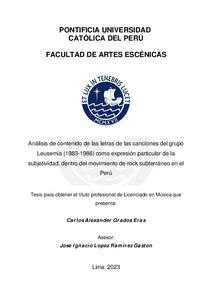| dc.contributor.advisor | Lopez Ramirez Gaston, Jose Ignacio | |
| dc.contributor.author | Grados Eras, Carlos Alexander | |
| dc.date.accessioned | 2023-11-21T22:54:54Z | |
| dc.date.available | 2023-11-21T22:54:54Z | |
| dc.date.created | 2023 | |
| dc.date.issued | 2023-11-21 | |
| dc.identifier.uri | http://hdl.handle.net/20.500.12404/26507 | |
| dc.description.abstract | En la década de los ochenta, en el Perú se desarrolló un movimiento de rock no comercial,
denominado subterráneo. Con una experiencia similar a la del movimiento punk
internacional, el grupo Leusemia fue uno de los principales impulsores del rock subterráneo y
el más representativo a nivel nacional. Por ello, la presente investigación se enfoca en
comprender cuáles eran las principales ideas, percepciones y valores que propugnaba el
grupo Leusemia en sus canciones. Para ello, se ha tomado como objeto de estudio
precisamente las letras de las canciones de la agrupación, las cuales fueron sometidas a un
análisis de contenido para extraer las principales temáticas, inferir mensajes directos e
indirectos, así como comprender la subjetividad implicada.
Se concluye en esta investigación que la movida subterránea surge a partir de un contexto
específico favorable a la emergencia del rock nacional en sus variantes: comercial y no
comercial (underground), y no por el contexto social de la crisis que venía atravesando el
país; así como por una necesidad comunicativa de los jóvenes impulsores. Los Leusemia
hicieron uso de diversos géneros musicales, siendo el punk uno de ellos. A diferencia de los
grupos musicales comerciales, en sus mensajes tratan de retratar la realidad inmediata y sus
propias percepciones, las cuales giraban en torno a una visión decadente de la ciudad de
Lima, llena de problemas sociales, violencia y muerte. Ante la desesperanza proponen que las
personas reaccionen actúen o se incorporen a la nueva comunidad de músicos subterráneos. | es_ES |
| dc.description.abstract | In the 80s in Peru, a particular non-commercial rock movement was developed that received
the name of “rock subterraneo”. With a similar experience to the international punk
movement, the Leusemia group was the main promoter as well as being the most
representative, hence the present investigation has focused on it, in order to understand those
that were the main ideas, perceptions and values they espoused. For this work, the lyrics of
the songs of this group have been taken as an object of study, the same ones that were
subjected to a content analysis to account for the main topics addressed, in this way it has
been possible to infer the direct and indirect messages propagated as well as understanding
the subjectivity involved. It has been possible to establish that more than a product of the
social context of crisis, the underground movement arises from a specific context favorable to
the emergence of national rock in its commercial and non-commercial (rock subterráneo)
variants, but above all due to a communicative need of the young promoters. Los Leusemia
made use of various musical genres, punk being one of them. Unlike commercial music
groups, in their messages they try to portray the immediate reality and their own perceptions,
which revolved around a decadent vision of the city of Lima, full of social problems, violence
and death; faced with hopelessness, they propose that people react, act, as can be by being
part of the new community of underground musicians. | es_ES |
| dc.language.iso | spa | es_ES |
| dc.publisher | Pontificia Universidad Católica del Perú | es_ES |
| dc.rights | info:eu-repo/semantics/openAccess | es_ES |
| dc.rights.uri | http://creativecommons.org/licenses/by-nc-sa/2.5/pe/ | * |
| dc.subject | Canciones | es_ES |
| dc.subject | Análisis de contenido | es_ES |
| dc.subject | Subjetividad | es_ES |
| dc.subject | Leusemia (Grupo musical)--Historia | es_ES |
| dc.subject | Música rock--Perú--Historia | es_ES |
| dc.title | Análisis de contenido de las letras de las canciones del grupo Leusemia (1983-1986) como expresión particular de la subjetividad, dentro del movimiento de rock subterráneo en el Perú | es_ES |
| dc.type | info:eu-repo/semantics/bachelorThesis | es_ES |
| thesis.degree.name | Licenciado en Música | es_ES |
| thesis.degree.level | Título Profesional | es_ES |
| thesis.degree.grantor | Pontificia Universidad Católica del Perú. Facultad de Artes Escénicas | es_ES |
| thesis.degree.discipline | Música | es_ES |
| renati.advisor.dni | 70463313 | |
| renati.advisor.orcid | https://orcid.org/0000-0003-2444-5437 | es_ES |
| renati.author.dni | 72151602 | |
| renati.discipline | 215426 | es_ES |
| renati.juror | Pastor Rubio, Lorena Maria | es_ES |
| renati.juror | Lopez Ramirez Gaston, Jose Ignacio | es_ES |
| renati.juror | Huerta Mercado Tenorio, Victor Alexander | es_ES |
| renati.level | https://purl.org/pe-repo/renati/level#tituloProfesional | es_ES |
| renati.type | https://purl.org/pe-repo/renati/type#tesis | es_ES |
| dc.publisher.country | PE | es_ES |
| dc.subject.ocde | https://purl.org/pe-repo/ocde/ford#6.04.04 | es_ES |







